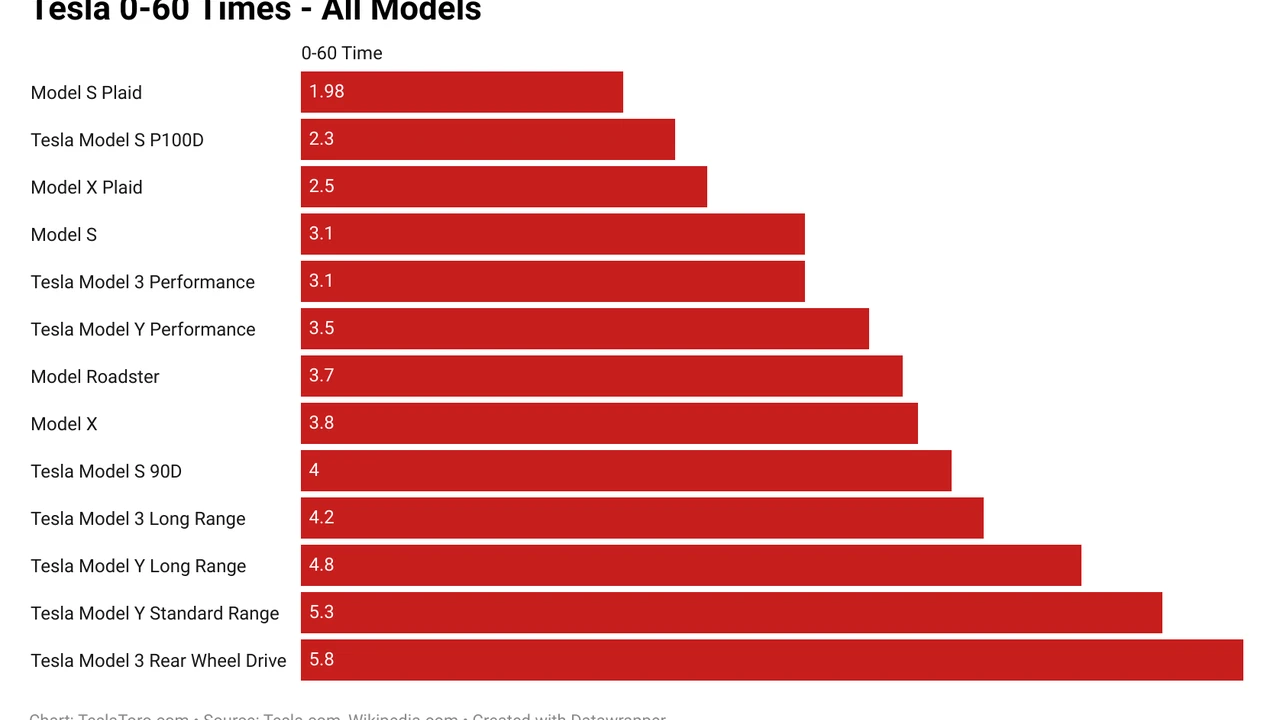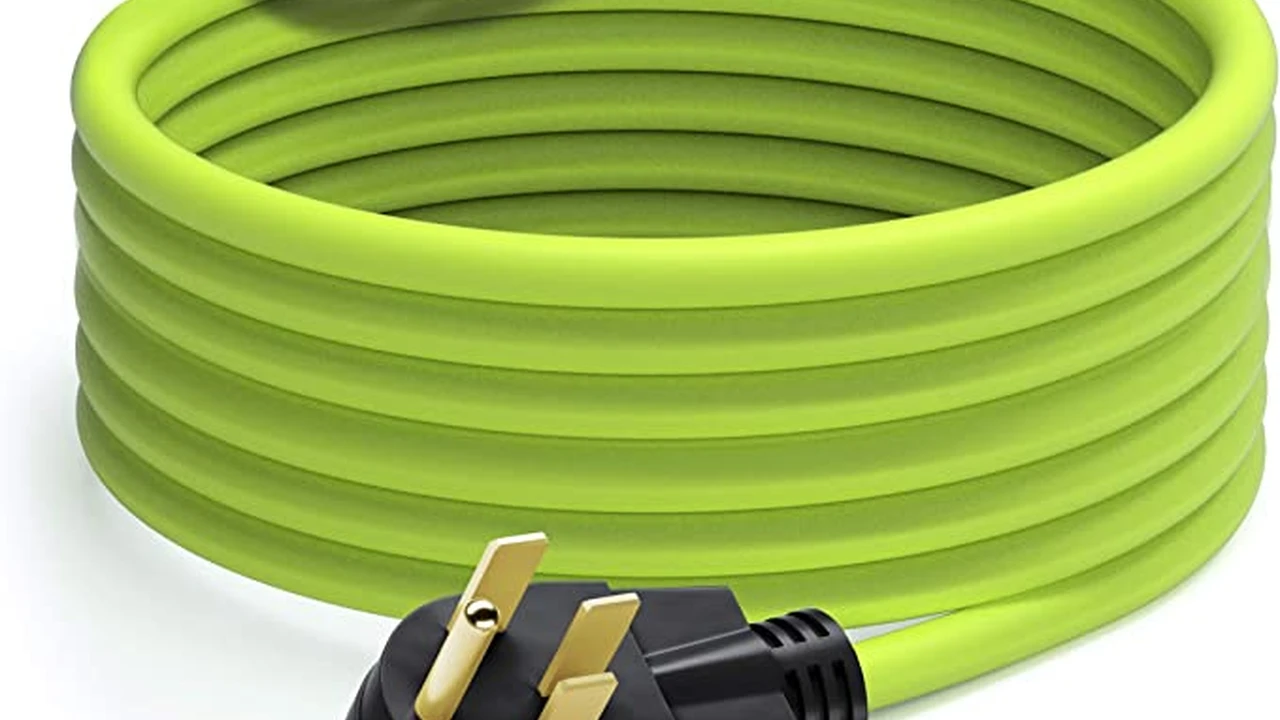EV Acceleration: Comparing 0-60 Times of Top Models

Interested in the thrill of EV acceleration? We compare 0-60 mph times of the leading electric vehicles on the market. Find out which EVs offer the quickest acceleration and how it compares to traditional gasoline cars. Get ready for a performance comparison!
Understanding EV Acceleration and 0-60 Times
Okay, let's talk about something that gets every car enthusiast's heart pumping: acceleration! In the world of electric vehicles (EVs), acceleration is a major selling point. We're not just talking about getting from point A to point B; we're talking about *how quickly* you can get there. The 0-60 mph (or 0-97 km/h) time is the gold standard for measuring a car's acceleration prowess. It's the time it takes for a vehicle to accelerate from a standstill to 60 miles per hour. A lower 0-60 time indicates faster acceleration. EVs are known for their instant torque, which translates to incredibly quick acceleration. Unlike gasoline cars, EVs don't need to rev up an engine to reach peak power. The power is available instantly, making them surprisingly quick off the line.
Top EV Models and Their Acceleration Performance
So, who are the speed demons in the EV world? Let's dive into some of the top models and their 0-60 times:
- Tesla Model S Plaid: This beast boasts a mind-blowing 0-60 mph time of around 1.99 seconds (with rollout subtracted). It's not just fast; it's *ludicrously* fast. The Plaid's tri-motor setup delivers incredible power and instant torque, making it one of the quickest production cars in the world.
- Tesla Model X Plaid: Don't let its SUV form fool you; the Model X Plaid is seriously quick. It clocks in at around 2.5 seconds for 0-60 mph. That's faster than many sports cars! Perfect for hauling the family and leaving sports cars in the dust.
- Lucid Air Grand Touring Performance: Lucid is making waves with its luxurious and powerful EVs. The Air Grand Touring Performance achieves a 0-60 mph time of approximately 2.6 seconds. It combines incredible performance with a luxurious interior and long range.
- Porsche Taycan Turbo S: Porsche knows a thing or two about performance, and the Taycan Turbo S doesn't disappoint. It hits 60 mph in around 2.6 seconds. The Taycan's all-wheel-drive system and sophisticated launch control contribute to its impressive acceleration.
- Tesla Model 3 Performance: The Model 3 Performance offers impressive acceleration at a more accessible price point. It achieves a 0-60 mph time of around 3.1 seconds. A great balance of performance, range, and affordability.
- Hyundai IONIQ 5 N: The new IONIQ 5 N delivers a very respectable 0-60 mph time of around 3.4 seconds. A great balance of performance, range, and affordability.
- Kia EV6 GT: The Kia EV6 GT delivers a very respectable 0-60 mph time of around 3.4 seconds. A great balance of performance, range, and affordability.
Comparing EV Acceleration to Gasoline Cars Performance
How do these EV acceleration times compare to traditional gasoline cars? Well, many high-performance sports cars and supercars can achieve similar 0-60 times. However, the *way* EVs deliver that acceleration is different. Gasoline cars often require careful gear selection and precise throttle control to achieve their best times. EVs, on the other hand, offer instant torque and seamless acceleration, making them feel incredibly responsive and easy to drive quickly. Even a relatively inexpensive EV can often out-accelerate a much more expensive gasoline car in everyday driving situations, thanks to that instant torque.
Factors Affecting EV Acceleration Performance
Several factors can influence an EV's acceleration performance:
- Battery State of Charge (SOC): A fully charged battery will generally deliver the best performance. As the battery SOC decreases, the available power may also decrease, slightly impacting acceleration.
- Temperature: Extreme temperatures (both hot and cold) can affect battery performance and, consequently, acceleration.
- Tire Condition: Proper tire inflation and good tire tread are essential for optimal traction and acceleration.
- Drive Mode: Many EVs offer different drive modes that prioritize efficiency or performance. Selecting a performance mode will typically maximize acceleration.
- Weight: The weight of the vehicle, including passengers and cargo, will impact acceleration.
Recommended Products for Enhancing EV Performance and Acceleration
While you can't significantly alter an EV's inherent acceleration capabilities, some products can help you optimize performance and driving experience:
- Performance Tires: Upgrading to high-performance tires can improve traction and handling, leading to better acceleration and cornering. Consider brands like Michelin, Pirelli, or Bridgestone. Prices range from $200 to $500 per tire, depending on size and model.
- Lightweight Wheels: Reducing the weight of your wheels can improve acceleration and handling. Look for lightweight alloy wheels from reputable brands. Expect to pay $500 to $1500 per wheel.
- Performance Brake Pads: While not directly related to acceleration, performance brake pads can improve braking performance, allowing you to brake later and accelerate harder. Prices range from $100 to $300 per set.
- OBD2 Performance Monitors: Some OBD2 monitors can display real-time performance data, such as 0-60 times, horsepower, and torque. This can help you track your EV's performance and identify areas for improvement. Prices range from $100 to $500.
Specific Product Recommendations for EV Acceleration Enthusiasts
Let's get into some specific product recommendations to enhance your EV experience:
Michelin Pilot Sport 4S Tires: Maximizing Traction
Use Case: These tires are designed for maximum grip and performance, ideal for drivers who want the best possible acceleration and handling. Perfect for track days or spirited driving on public roads.
Comparison: The Michelin Pilot Sport 4S offers superior grip and handling compared to standard all-season tires. They provide better acceleration, cornering, and braking performance.
Price: Approximately $300-$500 per tire, depending on size.
Forgestar F14 Lightweight Wheels: Reducing Rotational Mass
Use Case: These lightweight wheels reduce rotational mass, improving acceleration, handling, and braking performance. Ideal for drivers who want to maximize performance without sacrificing durability.
Comparison: Forgestar F14 wheels are significantly lighter than stock wheels, resulting in improved acceleration and responsiveness.
Price: Approximately $600-$1200 per wheel.
Unplugged Performance Sport Lowering Springs: Improving Handling and Aesthetics
Use Case: While not directly impacting acceleration, lowering springs improve handling and reduce body roll, allowing you to carry more speed through corners and accelerate out more effectively. They also improve the vehicle's stance.
Comparison: These springs offer a firmer ride and improved handling compared to stock springs.
Price: Approximately $300-$500 per set.
Understanding Different Driving Modes and Launch Control
Most modern EVs come equipped with different driving modes, each designed to optimize for different scenarios. These modes directly affect acceleration.
- Eco Mode: This mode prioritizes energy efficiency. Acceleration is typically limited to conserve battery.
- Normal/Comfort Mode: This mode offers a balance between performance and efficiency. Acceleration is generally good, but not maximized.
- Sport Mode: This mode maximizes performance. Acceleration is prioritized, and the throttle response is sharpened.
- Ludicrous/Plaid Mode (Tesla): Found on high-performance Tesla models, this mode unleashes the full potential of the powertrain, providing maximum acceleration.
Many high-performance EVs also feature launch control. This system optimizes the powertrain for maximum acceleration from a standstill. It typically involves pressing both the brake and accelerator pedals simultaneously and then releasing the brake to launch the vehicle.
The Future of EV Acceleration
The future of EV acceleration is bright. As battery technology improves and electric motors become more powerful, we can expect to see even quicker 0-60 times. Solid-state batteries, advanced motor designs, and improved aerodynamics will all contribute to faster and more efficient EVs. We're already seeing EVs that can rival the acceleration of supercars, and that trend is likely to continue. The electric revolution is not just about reducing emissions; it's also about delivering exhilarating performance.
:max_bytes(150000):strip_icc()/277019-baked-pork-chops-with-cream-of-mushroom-soup-DDMFS-beauty-4x3-BG-7505-5762b731cf30447d9cbbbbbf387beafa.jpg)






